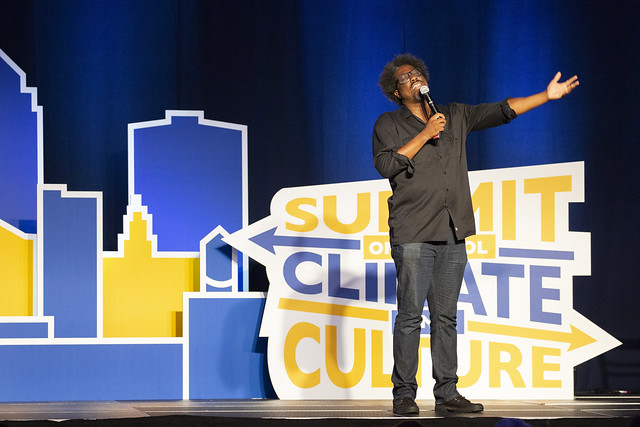The third time for the DMPS Summit on School Climate & Culture is not THE charm, it’s just the latest in a series for an event that’s quickly become a mainstay on the professional development circuit for educators.
More than 2,100 registrants streamed into the cavernous Grand Ballroom at the Iowa Events Center Monday morning with more than the usual Monday morning bounce and buzz. #ClimateCulture was already all aTwitter.
The opening keynote speaker was W. Kamau Bell. To label Bell a standup comic is accurate but grossly misleading, especially in his role at SSCC. His address was no joke, though it did elicit lots of laughter, much of it perhaps a bit nervous.
Bell’s profile has never been higher. He’s got an Emmy-winning docuseries on CNN, United Shades of America, and a special that released earlier this summer on Netflix, Private School Negro. He’s the author of The Awkward Thoughts of W. Kamau Bell. He also has three daughters ranging from newborn to elementary school (“I never thought about trying to teach Sami to read before she went off to school. You guys, teachers, knocked that out in about five days…”). His bona fides to speak at an event hosted by a diverse school district are legit. The fact that SSCC Director Jake Troja was able to book him speaks to the rising profile of this annual event, too.
Bell’s talk was entitled The W. Kamau Bell Curve: Ending Racism in About an Hour and was more or less equal parts senses of outrage and humor. It’s like a stump speech for a thought provocateur, campaigning all over the country for a culture that truly reflects principles declared to be “self-evident” by America’s founders.
The address wasn’t customized to an audience of educators. Bell relied on them to draw the obvious inferences in a school district where most students aren’t white but most teachers are. His keynote was a generic call to action for whites that’s especially resonant in an urban school district.
“Race isn’t real. It’s a social construct that was developed and used to divide people,” Bell said, an assertion buttressed with excerpts from US Census forms and headlines from around the world. But racism is a pervasive reality.
“Racism is every day, all the time and it happens at lots of different levels,” Bell said, including subliminal ones embedded in advertising, even for public service institutions like the Red Cross and schools. Again, Bell displayed evidence of what he was talking about.
He cited the moment when one of his three daughters was just born and their eyes locked as the first time in his life he realized another person was looking at him and not seeing him as black.
Coming on the cusp of a new school year, the summit’s a powerful one-two punch of pep talks and training sessions, sort of like what football teams experience this time of year, minus the perspiration.
“We’re drawing more attendees every year and more educators who want to be presenters in the breakout sessions,” said Troja. “The feedback from the first two has been extremely positive and we also encourage suggestions for how to improve the event. We’ve gotten great input.”
When this first assembly of the summit dismissed, it was on to a wide-ranging buffet of breakout sessions to make pedagogies fit the students instead of vice versa, including ones like Young Men of Distinction: Assisting Black Male Middle School Students in Reaching Their Potential & Chasing Their Dreams, Let’s Teach About Race and Unpacking the N Word.
The last slide of Bell’s presentation noted sarcastically, “Racism is now over,” as promised in the opening slide, right on schedule.
If only. There will always be more work to be done. But don’t worry. Troja has already locked in the first two keynote speakers for next year.






